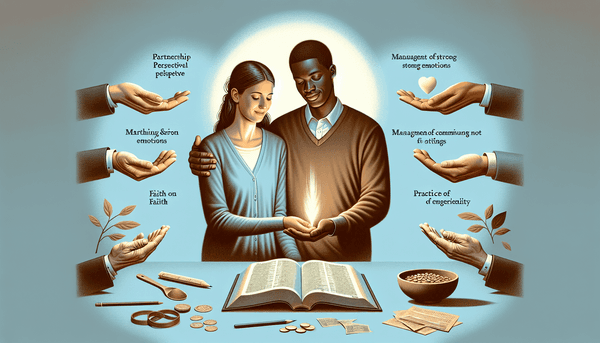The Relationship Between Husband and Wife
In the sacred bond of marriage, the Bible presents a framework of love, respect, and mutual submission. Ephesians 5:25 beautifully illustrates this principle with the words, 'Husbands, love your wives, just as Christ loved the church and gave himself up for her.' This sacrificial love is the cornerstone of the marital relationship, calling husbands to cherish their wives deeply. Likewise, Colossians 3:19 complements this by admonishing husbands to 'love your wives and do not be harsh with them,' which underscores the importance of kindness and empathy within the union. The Bible equally addresses wives, urging them in Colossians 3:18 to 'submit yourselves to your husbands, as is fitting in the Lord.' This submission is not one of inequality but of harmonious partnership, as both husband and wife are heirs together of the grace of life, as reminded in 1 Peter 3:7. The biblical narrative extends beyond mere roles, emphasizing the intrinsic value and honor due to a virtuous wife, as celebrated in the Proverbs 31 description of a woman of noble character.
Understanding the Mark of the Beast
The enigmatic 'mark of the beast' has been a subject of fascination and debate among scholars and believers alike. Revelation 13:16-18 introduces this mark as a symbol of allegiance to a powerful entity that opposes God, stating that 'it causes all, both small and great, both rich and poor, both free and slave, to be marked on the right hand or the forehead.' Those who carry this mark are depicted as followers of the beast, contrasting sharply with those who remain faithful to God. Revelation offers a call to wisdom and discernment, urging believers to understand the deeper implications of the mark and to stand firm in their faith. The passages serve as a stark reminder that spiritual allegiance is not to be given lightly and that one's ultimate loyalty must lie with the divine, as highlighted in Revelation 14:9-10 and Revelation 20:4. These scriptures encourage a thoughtful and prayerful approach to understanding the times and the challenges that face the faithful.
The Bible's Teachings on Anger and Lust
Human emotions such as anger and lust are addressed with profound insight within the scriptures. The apostle Paul, in Ephesians 4:26, advises believers, 'In your anger do not sin: Do not let the sun go down while you are still angry.' This guidance emphasizes the importance of resolving conflicts promptly and maintaining self-control. Similarly, James 1:19-20 speaks to the destructive nature of unchecked anger, which 'does not produce the righteousness that God desires.' On the topic of lust, Jesus Himself deepens the commandments by equating lustful thoughts with the act of adultery in Matthew 5:28, thus setting a high standard for purity of the heart. The call for believers is to flee from sexual immorality, as detailed in 1 Corinthians 6:18-20, and to nourish thoughts that are pure and pleasing to God, as encouraged in Philippians 4:8. These teachings form a moral compass that guides believers toward a life of integrity and holiness.
Conclusion
As we conclude our exploration of these biblical topics, we are reminded of the timeless relevance and depth of scripture. From the covenant of marriage to the end-time symbolism of the mark of the beast, from the personal battles with anger and lust to the spiritual act of tithing, the Bible provides guidance and wisdom for all aspects of life. These teachings challenge us to examine our hearts, align our actions with God's will, and live out our faith with integrity and love. May we continue to seek understanding through the scriptures and strive to apply these principles in our daily lives, growing ever closer to the image of Christ.






